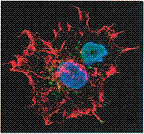Biochemistry, Department of

Gautam Sarath Publications
ORCID IDs
Document Type
Article
Date of this Version
1995
Abstract
Light-harvesting complex-II (LHC-II) phosphatase activity has generally been examined in the intact thylakoid membrane. A recent report of peptide-phosphatase activity associated with the chloroplast stromal fraction (Hammer, M.E et al. (1995) Photosynth Res 44:107–115) has led to the question of whether this activity is capable of dephosphorylating membrane-bound LHC-II. To this end, heat-treated thylakoid membranes were examined as a potential LHC-II phosphatase substrate. Following incubation of the thylakoid membrane at 60 °C for 15 min, the endogenous protein phosphatase and kinase activities were almost eliminated. Heat-inactivated phosphomembranes exhibited minimal dephosphorylation of the light harvesting complex-II. Peptide-phosphatase activities isolated from the thylakoid and stromal fraction were able to dephosphorylate LHC-II in heat-inactivated phosphomembranes. The stromal phosphatase showed highest activity against LHC-II at pH 9. Dephosphorylation of the LHC-II by the stromal enzyme was not inhibited by molybdate, vanadate or tungstate ions, but was partially inhibited by EDTA and a synthetic phosphopeptide mimicking the LHC-II phosphorylation site. Thus, the previously identified stromal phosphatase does appear capable of dephosphorylating authentic LHC-II in vivo.


Comments
Published in Photosynthesis Research 45 (1995), pp. 195-201. Copyright © 1995 Kluwer Academic Publishers. Used by permission.